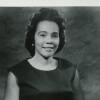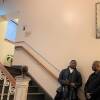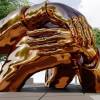Boston has a new monument. The Embrace, which honors Martin Luther King Jr. and Coretta Scott King’s civil rights legacy and formative years in Boston, was unveiled on the Boston Common Friday in a joyous ceremony attended by Massachusetts’ political leaders and members of the King family.
The 20-foot high bronze sculpture is inspired by a 1964 photo of the couple embracing after Martin Luther King Jr. learned he had won the Nobel Peace Prize. It’s the first new monument to come to the Boston Common in nearly a century, and the first to honor African Americans.
U.S. Rep. Ayanna Pressley said the couple's sculpture is “a reminder of their Boston origin story. … Before Georgia, there was Boston. Before Alabama, there was Boston. Before New York, there was Boston. Before Washington, there was Boston,” she said.
More Local News
Throughout musical performances of the Black national anthem and “America the Beautiful,” the crowd of hundreds of people danced, clapped and literally embraced each other despite rainy and muddy conditions on the Common.
Pressley said that was the message of the sculpture: “to embrace equality over racism; to embrace peace over militarism; to embrace grace over greed; to embrace unity over division; to embrace racial, economic, social justice over oppression; to embrace love over hate; to embrace one another.”
The couple met and fell in love in Boston in the 1950s when they were both students. Martin Luther King Jr. was a graduate student at Boston University, while Coretta Scott King was a musician, living in Beacon Hill and attending the New England Conservatory . She had already started her activism before meeting her future husband.
"Mom had been involved in the peace moment even before dad, dad said. She actually lead demonstrations, and they read a lot of the same books, so the magic really happened here,” Martin Luther King III said.
He said the monument “signified the bond of love” shared by his parents, and their time in the city where they met and “forged a partnership that would change America.”
At the unveiling ceremony, the person who brought the crowd to their feet was also the youngest of the speakers: Yolanda Renee King, Martin Luther King Jr. and Coretta’s Scott King’s 14-year-old granddaughter.
Although she never met her grandparents, she has studied their work closely and described the monument as “ love 360, ” allowing her to step underneath their embrace and feel their love surrounding her.
“I feel they are somehow with me.” she said. “That our spirits are joined in the quest for a just, loving and peaceful world. I am very proud to be their granddaughter. But I am also challenged by their inspiring legacies.”
And there it is! The Embrace is officially unveiled @GBHNews pic.twitter.com/O0OMwe0H21
— Meghan H. Smith (@meghansmith55) January 13, 2023
The monument was spearheaded by Embrace Boston, formerly known as King Boston, and designed by Brooklyn-based artist Hank Willis Thomas, who said he was inspired by “the capacity for each of us to be enveloped in love.”
The sculpture sits on the newly constructed 1965 Freedom Plaza, which etches in stone the names of 65 civil rights leaders who made a mark in Boston, some of whom were in attendance Friday. It also marks the Rev. King’s 1965 march from Roxbury to the Common, and sits a few miles away from the Twelfth Baptist Church in Roxbury , where King had served as an assistant minister in the 1950s.
Imari Paris Jeffries, executive director of Embrace Boston, said the monument marks just the beginning of the nonprofit’s work. It plans to form a center for economic and racial justice in Roxbury to promote research and policies that can continue the Kings’ legacy.
Paris Jeffries got emotional when he took the stage at the start of the ceremony. “I was trying not to cry,” he said. “I’m just so grateful to give something to the city that gave me so much.”
Quincey J. Roberts Sr., the inaugural executive director for the mayor’s Office of LGBTQ+ Advancement, said after attending the event that he was filled with love and optimism.
“This is all about moving things forward, together,” he said. “This also means to me legacy, because Coretta Scott King was one of the biggest advocates for LGBTQ rights.”
"Before Georgia, there was Boston. Before Alabama, there was Boston."-Rep. Ayanna Pressley
While messages of inclusion and community were present throughout the speaking program, not all Boston residents felt included in the day’s celebrations. Dozens of people watched on screens from behind fences which surrounded the sculpture, stage and seating area, which required a ticket to enter.
Sonali Anderson, a Boston resident, said she left work early to come to the event. She was surprised when she was stopped at the entrance gate and asked to present a ticket, which she did not know was needed.
"I just find it to be really ironic that this is an event around MLK and freedom and dismantling barriers of inequity when there's — as you look — there's literally physical fences that are preventing, specifically, Black people from supporting this event around MLK, and celebrating him, to be front and center," Anderson said. "I'm looking around and I'm seeing chairs — a lot of them are filled with white people."
Boston Mayor Michelle Wu talked directly to the people watching outside the fences on Tremont Street and in the Common during her remarks.
“This monument is for you too,” she said to applause. “The Embrace is for all of us, especially our residents who are coming out on their balconies — they will be watching over this for us.”
Embrace Boston told GBH News that the barriers were due to security and safety protocols.
“We are grateful for the public’s support,” Embrace Boston's Director of Digital Strategy and Production Greg Ball said in a statement. “This historic monument will be on the Boston Common in perpetuity. When fencing and other structural elements are removed it will be safe and secure for all to walk around, touch, visit and, of course, embrace.”
GBH News’ Liz Neisloss, Mark Herz and Matt Baskin contributed to this report.








